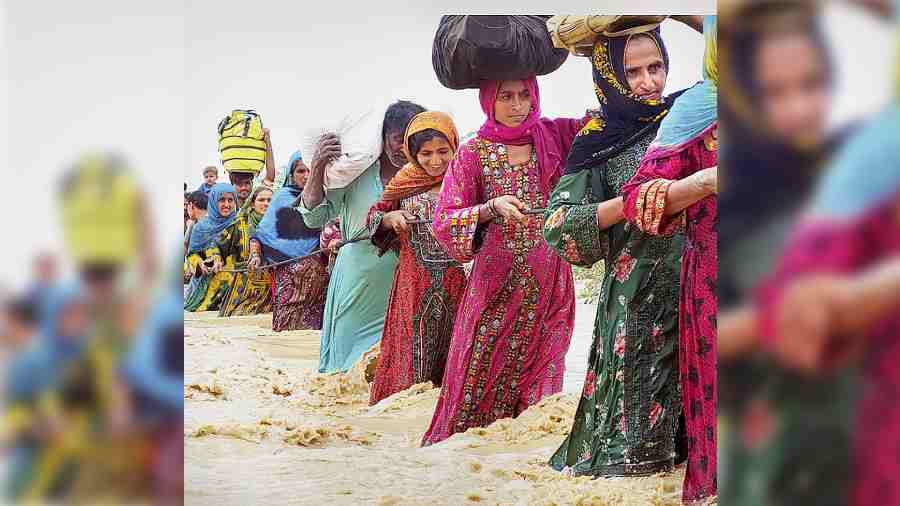I was going to write about the fast-changing political landscape of Pakistan but couldn’t bring myself to start with those developments at a time when other devastating events are taking place right in front of our eyes.
First, there is the Bilkis Bano case. A Muslim woman was gang-raped during the communal riots in Gujarat 20 years ago. Her family members were raped, maimed, and killed in front of her eyes. Her three-year-old daughter was killed by the men to satisfy their anti-Muslim hatred. She ran from pillar to post for justice. But now her rapists and her family’s murderers have been set free. Her statement after their acquittal was so gut-wrenching that one could almost hear the numbness, the shock, the anger, the fear and the frustration through the words that had been put in writing. The haplessness of a woman from a minority community in India where the Hindutva brigade celebrated the release of her tormentors cannot be described in mere words. It just boggles the mind to think that those who committed these heinous crimes are now free; that those men have the backing of other powerful men; that they were able to get away; that a woman who was gang-raped because she belonged to a minority faith and her family killed because they were Muslims is still looking for justice. It would be wrong for anyone else to say they understand her pain because no one can except her. From the comfort of our living rooms, we can only express our anger but we cannot imagine what she must be going through, and has been put through, in these two decades. We can only hope that India’s justice system will not let her down. We can only hope that minorities will not be discriminated against.
Meanwhile, in Pakistan, devastating floods across the country have killed hundreds and thousands of people have lost their homes, their livelihoods, and their lives as they knew it. They are waiting for food and shelter and are trying to survive. The pictures and videos of floods from different parts of the country stare us in the face, jolting us from our obsession with politics, nudging us to pay attention to the lives that have been destroyed by a national calamity. Recently, the Pakistan Peoples Party chairman and foreign minister, Bilawal Bhutto Zardari, appealed to the media that the foremost priority right now should be the victims of flooding and not the ongoing political tamasha. Those of us who are privileged enough to write about them from the comforts of our homes won’t be able to understand someone’s pain whose entire life gets drowned in rains and floods. Pictures of men and women of all ages and children affected by the floods are painful. We can only raise our voice, try to organise donations, and hope that the government and the people pay enough attention to them so that they can rebuild their lives in the future. We can only hope.
On the political front, Pakistan is going through what we witnessed decades ago in the 1990s and much worse. A mainstream television channel, ARY News, has been taken off air because it aired a beeper by the Pakistan Tehreeke-Insaf leader, Shahbaz Gill. On August 9, Gill, who was Imran Khan’s chief of staff, was arrested on charges of sedition and incitement to mutiny. PTI and Gill have levelled serious allegations of custodial torture, including sexual abuse. These allegations are extremely serious and alarming. It is worrying that a political opponent is being treated in an inhumane way. But it is not surprising. Like many other South Asian countries, custodial torture is common in Pakistan. Earlier this week, Human Rights Watch said, “Allegations of torture in political cases need to be investigated by authorities independently of the political interests of the governing authorities. During previous governments, there have been numerous credible allegations of torture and ill-treatment of political opponents or critics of the government.” HRW also demanded that Pakistan should criminalise torture. We hope that the authorities pay heed to this advice because for far too long, custodial torture has been used as a tool against political opponents, critics and dissidents alike. We hope that this cruel practice stops, once and for all. We hope that nobody’s human dignity is violated, that human rights and fundamental rights are upheld. We can only hope.
Imran Khan’s popularity is rising by the day, as we witnessed in the recent by-elections, but he is also facing a number of cases, be it the foreign funding case, the Toshakhana issue, terrorism charges, and contempt of court proceedings. Imran Khan’s politics is disruptive. He has been able to get away with a lot that other leaders didn’t but he also has the people’s support. All sorts of rumours about his probable arrest are doing the rounds but will it serve any purpose? Not really.
This is not the time for political arrests. It is time for political healing. Pakistan has seen more than its share of political chaos in the past few months. Rising inflation is breaking the backs of most Pakistanis. A weak economy and political instability help no one. All parties in the coalition government have had to pay a political price due to rising inflation, particularly the PML-N, which is the economic face of this government. At this time, political arrests, censorship and other draconian measures will further dent the government’s fast-depleting credibility. Imran Khan is not ready to sit with his political opponents but we hope that sooner rather than later, he realises that the only way forward out of this unending mess is for the political class to sit together and chart a way forward. We hope that the politicians realise that it is time to come together and forge a consensus on how to end what’s happening. Political confrontation will lead to disastrous results for our democracy. We can only hope.
Mehmal Sarfraz is a journalist based in Lahore; mehmal.s@gmail.com










